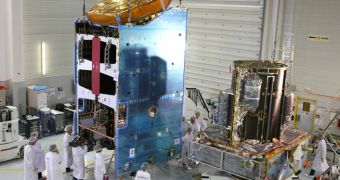The world's largest communications satellite platform, Alphabus, has finally been accepted as the basis for the first in a string of many spacecraft. The platform now provides satellite constructors with additional capabilities, that were unavailable when it was first developed.
A satellite bus is the main structure on which all other components are integrated. It provides structural integrity to the spacecraft, and is also responsible for distributing power across the entire satellite.
Alphabus is the largest such platform in existence today. It was developed by a collaboration of companies, including EADS Astrium and Thales Alenia of Rome, Italy. Several space agencies collaborated in the endeavor as well.
The bust would have still been only a project were it not for the involvement of the French space agency CNES and the European Space Agency (ESA). Now that the platform was formally accepted for its first satellite, all those years of planning and designing paid off.
The event took place on June 16, when experts announced that Alphasat I-XL will become the first satellite ever to use the new bus. All technical requirements for this have been met, officials from CNES, ESA, and all involved companies announced at the Paris Air & Space Show.
“The platform provides unrivaled payload capacity to operators for commercial satcom missions and services such as fast Internet to remote locations, high-definition and 3D digital TV broadcast, and communication to mobiles,” an ESA press release reads.
“In addition, the high-power platform offers opportunities for Europe’s satcom industry and ESA to work together to develop cutting-edge technologies for new services such as air traffic management or security communications,” the statement goes on to say.
Alphasat I-XLis developed by ESA in cooperation with renowned satellite builder Inmarsat. Planned for launch early 2013, the spacecraft will carry a new generation of advanced geomobile L-band communications services across Europe, Africa and the Middle East.
“Such initiatives in partnership with satellite operators will foster the development of innovative technologies and services to serve the worldwide market and Europe’s citizens new needs,” Magali Vaissiere, the director of ESA Telecommunications and Integrated Applications, said.
Her opinions were echoed by the director of the CNES Space Center Toulouse, Marc Pircher.

 14 DAY TRIAL //
14 DAY TRIAL //